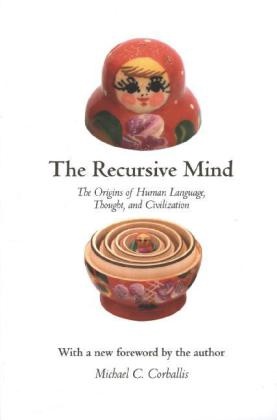Read more
The Recursive Mind challenges the commonly held notion that language is what makes us uniquely human. In this compelling book, Michael Corballis argues that what distinguishes us in the animal kingdom is our capacity for recursion: the ability to embed our thoughts within other thoughts. "I think, therefore I am," is an example of recursive thought, because the thinker has inserted himself into his thought. Recursion enables us to conceive of our own minds and the minds of others. It also gives us the power of mental "time travel"--the ability to insert past experiences, or imagined future ones, into present consciousness. Drawing on neuroscience, psychology, animal behavior, anthropology, and archaeology, Corballis demonstrates how these recursive structures led to the emergence of language and speech, which ultimately enabled us to share our thoughts, plan with others, and reshape our environment to better reflect our creative imaginations.
List of contents
Preface vii Chapter 1 What Is Recursion? 1 PART 1: Language 17 Chapter 2: Language and Recursion 19 Chapter 3: Do Animals Have Language? 36 Chapter 4: How Language Evolved from Hand to Mouth 55 PART 2: Mental Time Travel 81 Chapter 5: Reliving the Past 83 Chapter 6: About Time 100 Chapter 7: The Grammar of Time 112 PART 3: Theory of Mind 129 Chapter 8: Mind Reading 131 Chapter 9: Language and Mind 151 PART 4: Human Evolution 167 Chapter 10: The Recurring Question 169 Chapter 11: Becoming Human 181 Chapter 12: Becoming Modern 208 Chapter 13: Final Thoughts 221 Notes 227 References 253 Index 281
About the author
Michael C. Corballis
With a new foreword by the author
Summary
Challenges the commonly held notion that language is what makes us uniquely human. This book argues that what distinguishes us in the animal kingdom is our capacity for recursion: the ability to embed our thoughts within other thoughts.
Additional text
"The book nicely represents current trends in evolution-based cognitive science and presupposes very little by way of background."---Mark Aronoff, Quarterly Review of Biology
Report
"The Recursive Mind: The Origins of Human Language, Thought, and Civilization, is a fascinating and well-grounded exposition of the nature and power of recursion. In its ultra-reasonable way, this is quite a revolutionary book because it attacks key notions about language and thought. Most notably, it disputes the idea, argued especially by linguist Noam Chomsky, that thought is fundamentally linguistic--in other words, you need language before you can have thoughts."--Liz Else, New Scientist

